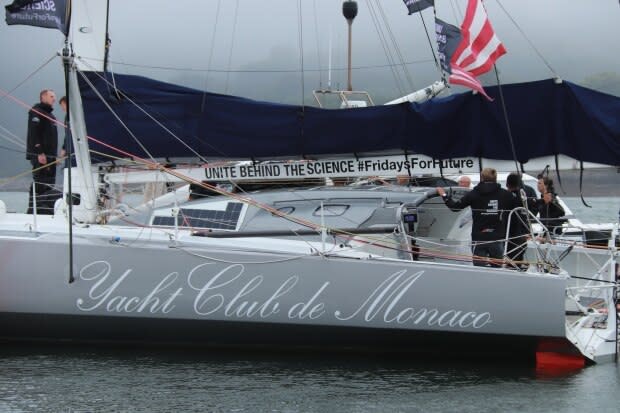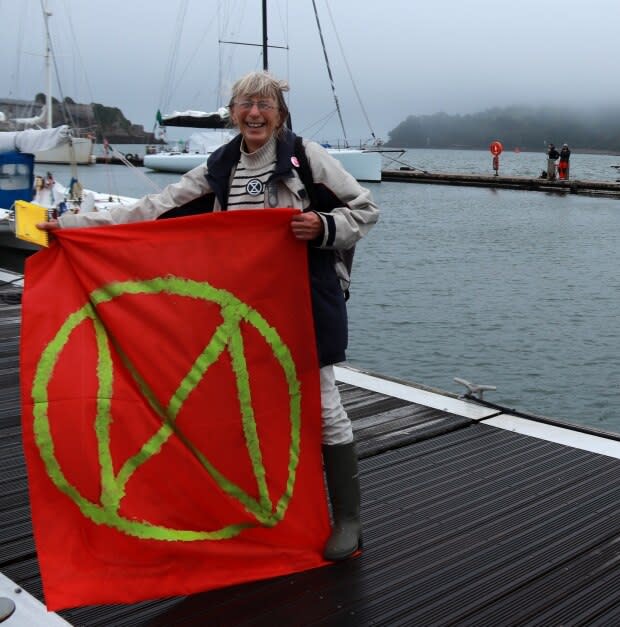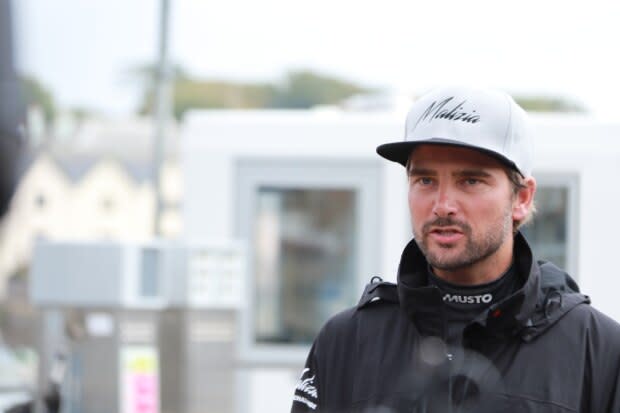'She's a phenomenon': Climate activist Greta Thunberg sailing into stiff winds in U.S.
Greta Thunberg doesn't look like a world-beater. A tiny figure with a waist-length braid and a broad, open face, she stood calmly facing a barrage of reporters this week in Plymouth, England.
She's headed to New York and a tour of the Americas as a headliner — one of the most sought-after personalities in the environmental movement, and she's just 16, taking a gap year from high school.
"I'm not that special," she said, responding to a question on whether she could influence U.S. President Donald Trump on climate change.
"I can't convince everyone and instead of speaking to me and to the school-striking children, [Trump's team] should be talking to actual scientists and experts."
The climate activist from Sweden is both humble and keenly aware of the powerful pulpit she now occupies. In just one year, she's inspired millions, particularly youth, to rally around a wounded climate.
She's met the Pope, addressed European parliaments, chastised CEOs at the World Economic Forum and secured a nomination for the Nobel Peace Prize.
But the higher she flies as "brand Greta," the more her critics attack her message and methods. Even at 16, becoming an activist has made her a target.

She arrived in England by train, refusing to fly, eschewing the heavy carbon footprint of air travel. So to cross the Atlantic Ocean, she's sailing on an 18-metre elite racing yacht, the Malizia II, with two professional skippers, her dad, and a documentary filmmaker.
"I'm not telling anyone what to do or what not to do," she said when asked if she wants people to curtail or stop flying.
"I am one of the very few people in the world who actually can do this, and I think I should take this chance."
But indirectly, she is telling people what she thinks of their choices.
"Her decisions to be vegan and not to fly — there is moral virtue signalling in those actions," says Mike Hulme, a professor of human geography at Cambridge University.
Thunberg began protesting outside the Swedish parliament in August 2018, a solitary figure with a sign and a worry that too few adults she knew were consumed by climate change.
"She had no idea of the consequences of what her strike would lead to," says Hulme, who attributes part of her draw and charm to an "innocence."
She appeared to "enter into this unilaterally, which is an interesting angle in someone's political activism," he says.
Thunberg also played into a new climate news cycle around the same time as the International Panel on Climate Change released a significant report warning of threats to the planet if it warmed above an additional 1.5 C.

"At the moment, everyone's following Greta. She's a phenomenon. But that doesn't hold a magic key to unlock the deeply difficult politics of climate change," says Hulme.
"It's way too early to be able to evaluate whether she's made a difference to the hard-nosed politics that have prevented the world [from reducing its] carbon emissions over the last 30 years."
On Wednesday, as she sailed out of Plymouth harbour, a crowd gathered at Devil's Point waved and cheered her on her way.
"I think she's Greta the Great," said Mozza Brewer, a fan who came from nearby Devon to wish her well. Brewer, who is part Finnish and part British, took note of Thunberg on television at a huge climate rally in Helsinki last fall.
"Gosh, who is this girl from Sweden, who has thousands of Finns listening to her?" Brewer asked herself.
"I want her to know there is so much love for her in the world; so many support what she's doing in spite of the trolls and the negativity about what this young woman has achieved."
Personal attacks
But the winds blowing against Thunberg are also gathering force. And attacks on her in social media are personal.
In a blog post in Australia's Herald Sun, headlined "The Disturbing Secret to the Cult of Greta Thunberg," columnist Andrew Bolt wrote "no teenager is more freakishly influential than Greta Thunberg, the deeply disturbed messiah."
Steve Milloy, a former member of Trump's Environmental Protection Agency transition team, tweeted, "She's ignorant, maniacal and is being mercilessly manipulated."
A member of the Welsh Assembly tweeted a photoshopped picture of her, with satanic symbols in her eyes, saying "It's shaping up to be the hottest day of the year — please remember: No electric fans, definitely no air conditioning. Greta has spoken…."
On Wednesday night, just after Thunberg and her racing team sailed off, a prominent U.K. businessman sparked a particularly virulent Twitter storm after he quipped "Freak yachting accidents do happen in August…"
Arron Banks, a Brexit backer, was roundly slagged in a series of late-night tweets.
"Disgraceful," wrote Labour MP Tonia Antoniazzi, "his tweet should be reported as a hate crime."
"You're wishing a potentially fatal accident onto a 16-year-old girl, why …?" tweeted actor Amanda Abbington.
Banks later said he was "joking" and that "lefties have no sense of humour."
Thunberg bats off her critics, seemingly impervious, at least in public.
"I'm not concerned about reactions [from climate change doubters]. What I am concerned about is whether we will do something or not, whether the people in power will react and act with necessary force," she said in Plymouth
Thunberg has a plain, direct way of speaking that cuts through political speak.
"There are always going to be people who don't understand or don't accept the united science, and I will just ignore them because, I mean, I'm only acting and communicating on the science, and if they don't like that, then, I mean, what have I got to do about that?"

Her slogan, "Unite Behind the Science," is emblazoned on the mainsail of the yacht, now crossing the Atlantic Ocean.
But Hulme warns that approach is flawed.
"If she is simply saying, 'Well, listen to the scientists,' at one level, that ends up being a vacuous message.
'It doesn't say what India or China or Indonesia should be doing about their carbon emissions. It doesn't tell us whether we should be replacing our existing coal energy with new nuclear energy. It doesn't get us through these troubling politics."
On Friday afternoon, the Malizia II was 4,800 kilometres from New York, travelling at 22 km/h (12 nautical miles per hour). It's an elite vessel but designed for racing, not a pleasure cruise.

Greta and her dad will use a bucket for a toilet and sleep on bunks they can winch up tight against the hull in stormy weather.
Which might describe the kind of reception she could receive in the United States.
While wildly popular, she will also be fresh prey for climate doubters anxious to blunt her message.
Her U.S. followers, though, are ready, preparing signs that say "Make America Greta Again."


